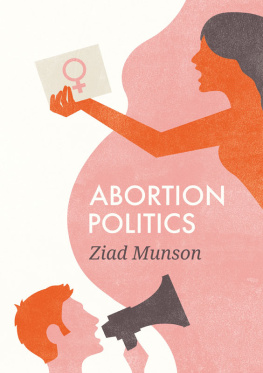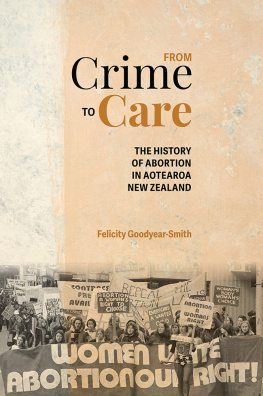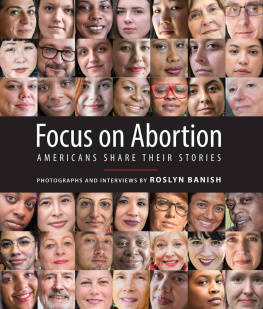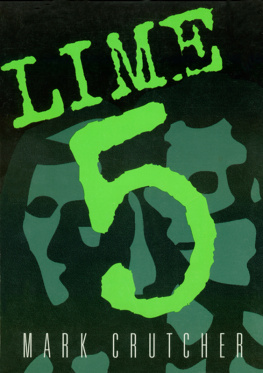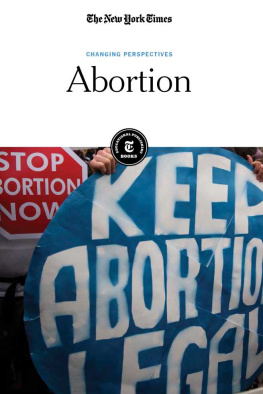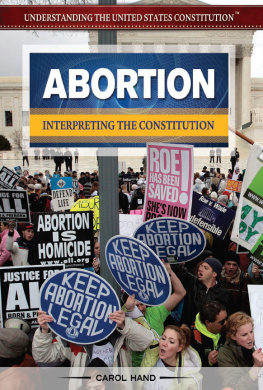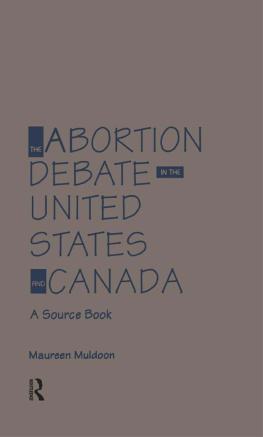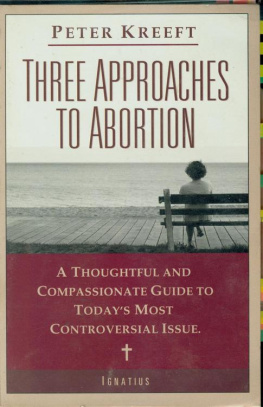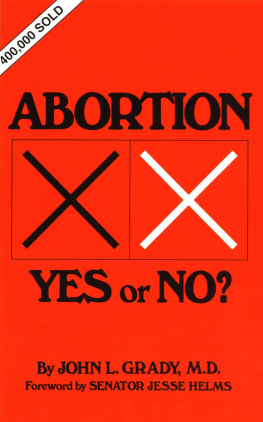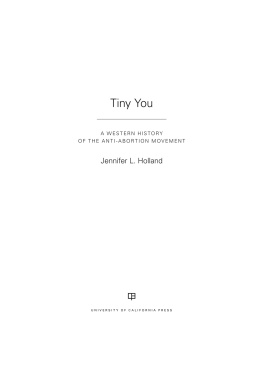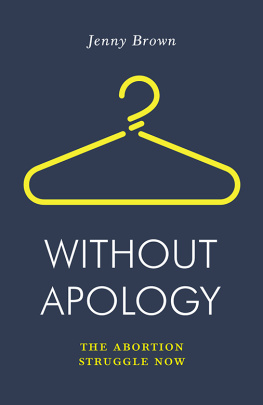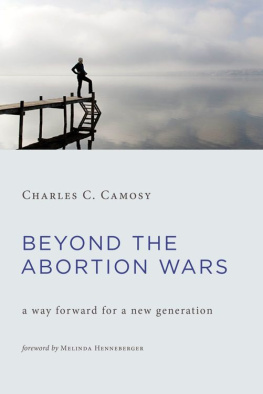
Series Title
Social Movements series
- Colin J. Beck, Radicals, Revolutionaries, and Terrorists
- Stephanie Luce, Labor Movements: Global Perspectives
- Ziad Munson, Abortion Politics
- Lisa M. Stulberg, LGBTQ Social Movements
- David Walls, Community Organizing: Fanning the Flames of Democracy
Copyright page
Copyright Ziad Munson 2018
The right of Ziad Munson to be identified as Author of this Work has been asserted in accordance with the UK Copyright, Designs and Patents Act 1988.
First published in 2018 by Polity Press
Polity Press
65 Bridge Street
Cambridge CB2 1UR, UK
Polity Press
101 Station Landing
Suite 300
Medford, MA 02155, USA
All rights reserved. Except for the quotation of short passages for the purpose of criticism and review, no part of this publication may be reproduced, stored in a retrieval system or transmitted, in any form or by any means, electronic, mechanical, photocopying, recording or otherwise, without the prior permission of the publisher.
ISBN-13: 978-0-7456-8878-7 (hardback)
ISBN-13: 978-0-7456-8879-4 (paperback)
A catalogue record for this book is available from the British Library.
Library of Congress Cataloging-in-Publication Data
Names: Munson, Ziad W., author.
Title: Abortion politics / Ziad Munson.
Description: Medford, MA : Polity, 2018. | Series: Social movements | Includes bibliographical references and index. |
Identifiers: LCCN 2017050359 (print) | LCCN 2017061152 (ebook) | ISBN 9780745688824 (Epub) | ISBN 9780745688787 (hardback) | ISBN 9780745688794 (paperback)
Subjects: LCSH: Abortion--Political aspects--United States. | Abortion--Government policy--United States. | BISAC: SOCIAL SCIENCE / Sociology / General.
Classification: LCC HQ767.5.U5 (ebook) | LCC HQ767.5.U5 M8596 2018 (print) | DDC 362.1988/80973--dc23
LC record available at https://lccn.loc.gov/2017050359
Typeset in 11 on 13 pt Sabon by
Fakenham Prepress Solutions, Fakenham, Norfolk, NR21 8NN
Printed and bound in Great Britain by Clays Ltd St. Ives PLC
The publisher has used its best endeavours to ensure that the URLs for external websites referred to in this book are correct and active at the time of going to press. However, the publisher has no responsibility for the websites and can make no guarantee that a site will remain live or that the content is or will remain appropriate.
Every effort has been made to trace all copyright holders, but if any have been inadvertently overlooked the publisher will be pleased to include any necessary credits in any subsequent reprint or edition.
For further information on Polity, visit our website: www.politybooks.com
Dedication page
To Willow and Elliot
Acknowledgments
Like so many books, this one has really been a collaborative effort. Conversations with Bayliss Camp, Drew Halfmann, Michael Heaney, Carole Joffe, and Judy Lasker helped me pin down and better articulate some of the major issues raised in the book. A number of students assisted me with research, including Therese Corcoran, Ginger Handley, Natalie Bourman-Karns, and Harvey Nicholson. I also want to thank Lehigh University for the sabbatical during which I laid most of the groundwork for what is written here. I received superb feedback from audiences at several American Sociological Association meetings, the 2016 ComparativeHistorical mini-conference in Seattle, the Politics and Protest workshop at CUNY, colloquia in my own department at Lehigh University. Two of the manuscripts anonymous reviewers went above and beyond the call in providing constructive feedback. Thanks to my family, who picked up a lot of the slack I left on the homefront in the final months of putting the manuscript together. Finally, thanks to all of the scholars and activists from whom Ive learned so much about this subject over the years. Your work has not only educated me, but inspired me.
Introduction
Todd Akin was running to represent Missouri in the US Senate in 2012. A former IBM salesman and steel mill manager, Akin had a quarter century of experience as a politician, serving twelve years in the Missouri House of Representatives, then another twelve years in the US House of Representatives. His campaign for the next step in his long political career, to become a US Senator, was going well. He was running as a conservative Republican in a state that had increasingly voted for Republican candidates in recent elections. He had the strong support of the conservative Tea Party movement and national conservative groups who were spending millions of dollars on his behalf. His opponent, Democrat Claire McCaskill, was considered one of the most vulnerable Senate incumbents in the nation.
Just over two months before the election, Akin was interviewed by local Fox Network affiliate KTVI in St. Louis, during which host Charles Jaco asked him about his abortion views: What about in the case of rape? Should it be legal or not? Akin, who had been an activist in the pro-life movement even before his political career, repeated his longstanding position that abortion should be illegal even when a pregnancy is the result of rape. In explaining this position during the interview, he suggested both that some women may falsely claim rape to obtain an abortion and that female physiology made pregnancy as a result of rape extremely rare. If its a legitimate rape, Akin said, the female body has ways to shut that whole thing down.
His remarks set off a national firestorm of controversy. Critics, particularly in the pro-choice movement, pointed out, correctly, that the idea women are unlikely to become pregnant as a result of rape is a myth. In fact, the chance of sexual intercourse leading to pregnancy is the same whether the intercourse is the result of rape or consensual sex (Holmes et al. 1996). Moreover, they saw Akins distinction between legitimate and illegitimate rape claims as perpetuating the dangerous myth that false rape claims are common. Research shows that the majority of rapes are never reported, and only between two percent and eight percent of rape charges are false (Lonsway, Archambault, and Lisak 2009). On the other side, Akin supporters, particularly in the pro-life movement, stood by his candidacy and his specific comments about abortion. Missouri Right to Life, the state affiliation of the National Right to Life Committee (NRLC), repeatedly came to Akins defense, saying that his words were being misinterpreted and that the central point of Akins remarks was that all unborn children should be protected (Keller 2012). Former Arkansas governor and presidential candidate Mike Huckabee dismissed Akins words as the verbal gaffe of a principled pro-life advocate (Holt 2012).
The incident generated national political controversy, as politicians, commentators, pundits, editorial pages, journalists, bloggers, and scholars all debated the implications of Akins words and the larger debate over abortion. The discussion tied the abortion debate to a myriad different concerns. At issue was medical science, as people debated beliefs about fertility under different conditions. At issue was the problem of sexual assault, as people debated legal definitions and the boundaries of consent. At issue was partisanship, and the implications the incident might have for the fortunes of the two political parties and control of the US Senate. At issue were questions of morality, and whether there were such things as good and bad abortions. At issue was gender, as the question was raised of whether men and women had an equal right to make policy that impacted reproductive rights. These many debates caused Akins political fortunes to collapse, and he lost the election to Senator McCaskill, garnering only 39 percent of the vote in the same election that fellow Republican Mitt Romney received almost 54 percent of the Missouri vote for President.
Next page
